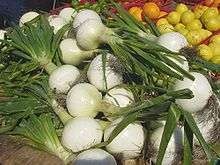Sweet onion
A sweet onion is a variety of onion that is not pungent. Their mildness is attributable to their low sulfur content and high water content when compared to other onion varieties.
Origins in the United States
United States sweet onions originated in several places during the early twentieth century.
Vidalia onions were first grown near Vidalia, Georgia, in the early 1930s. Today the name refers to onions grown in a 20-county production region in the state of Georgia as defined by both Georgia state statute[1] and by the U.S. Code of Federal Regulations.[2]
South Texas also acquired what is known as the 1015 onion in the early 1980s by Dr. Leonard Pike, a horticulture professor at Texas A&M University, Texas. 1015 Onions are actually named for their optimum planting date, October 15. Grown only in the Rio Grande Valley of South Texas, this large, prized onion was developed after ten long years of extensive research, endless testing and a million dollars in cost. As a result, Texas achieved a mild, exceptionally sweet onion that lives up to its nickname - the "Million Dollar Baby". Onions are Texas' leading vegetable crop. The state produces mostly sweet yellow varieties. The sweet onion was adopted as Texas' official state onion in 1997.
The Walla Walla sweet onion is named for Walla Walla county in Washington State where it is grown.[3] Its development began around 1900 when Peter Pieri, a French soldier who settled in the area, brought a sweet onion seed from the island of Corsica with him to the Walla Walla Valley.[4] This sweet onion was developed by selecting and reseeding onions from each year's crop that possessed sweetness, jumbo size, and round shape. It is the designated vegetable of Washington State.[5][6][7]
Other U.S. varieties
- Imperial Valley Sweets come from the Imperial Valley in far southern California. This is one of the leading growing areas for sweet onions, although they are available only from late April through June.
- The Carzalia Sweet onion is a variety of sweet onion grown by Carzalia Valley Produce in Columbus, New Mexico.
- The Sunbrero (Texas) Sweet Onion is grown in Texas and distributed by Sweet Onion Trading Company, Melbourne, Florida.
- The Sweetie Sweet is a variety of sweet onion grown in the Mason Valley in Yerington, Nevada. The Sweetie Sweet onion can be found in marketplaces September through the end of January.
- The Glennville sweet onion is grown in Tattnall County, in Glennville, Georgia.
- Mattamuskeet Sweets are a type of sweet onion grown in Eastern North Carolina, especially in eastern Beaufort and Hyde Counties. This particular variety is a popular choice for cooking and consumption amongst residents of coastal Carolina, and is named for Lake Mattamuskeet in central Hyde County.
- Maui onions are one of the smaller varieties of onions grown on the Hawaiian island of Maui. They are trademarked "Kula-grown" onions.
- Pecos onions are sweet onions grown in the Pecos Valley in the state of Texas.
- Texas 1015 Super Sweet onions are named for their optimum planting date, October 15. They were developed by Texas A&M University.
Bermuda onions
The Bermuda onion is a variety of sweet onion grown on the island of Bermuda. The seeds were originally imported from the Canary Islands before 1888. Onion export to the United States made up such a prominent feature of Bermudian life, they soon adopted the nickname onions. Sweet onions from Texas largely displaced the Bermuda variety.[8]
European onions
| Wikimedia Commons has media related to Oignon doux des Cévennes. |
In Europe, the Oignon doux des Cévennes from Cévennes, South East France has PDO status.
References
- ↑ Vidalia Onion Act of 1986, O.C.G.A. § 2-14-130 et seq., available at http://agr.georgia.gov/Data/Sites/1/ag_Marketing/Vidalia%20Onion/files/Vidalia%20Onion%20Act%20of%201986.pdf
- ↑ 7 C.F.R. §955.5
- ↑ "History of Walla Walla"
- ↑ "Famous People You Never Heard Of: Notable Gardeners, Horticulturists, Botanists, and Landscape Gardeners from the Pacific Northwest"
- ↑ "Sweet Onion Varieties - Home Cooking". Homecooking.about.com. 2013-11-14. Retrieved 2013-11-21.
- ↑ "Sweet Texas Onions 1015 Information, Recipes and Facts". Specialtyproduce.com. Retrieved 2013-11-21.
- ↑ http://leg.wa.gov/Symbols/Pages/default.aspx
- ↑ CookInfo.com http://www.cooksinfo.com/bermuda-onions. Retrieved 8 November 2014. Missing or empty
|title=(help)

.jpg)